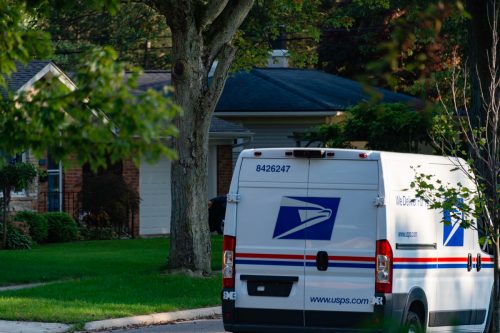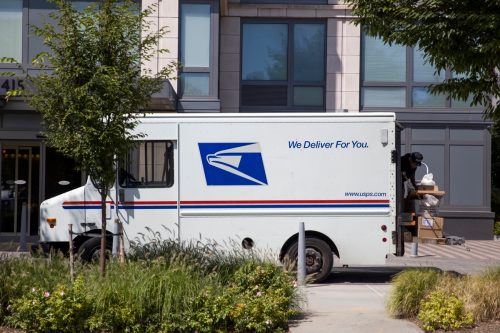USPS Changes Are “Destroying the Postal Service,” Workers Warn

Mail prices have gone up. Deliveries have slowed down. And those are just some of the changes that the U.S. Postal Service (USPS) has undergone over the past few years. When Louis DeJoy took over as Postmaster General in 2020, he vowed to overhaul the entire agency in order to pull it out of financial and operational ruin. In March 2021, he unveiled a 10-year transformation plan called Delivering for America (DFA), and this initiative has prompted a near-constant flow of adjustments. But DeJoy’s plans are not going over well with everyone, including USPS employees. Read on to find out why some workers are saying that these changes are “destroying the Postal Service.”
RELATED: USPS Is Making These Changes to Your Mail, Starting Now.
Rural USPS carriers recently reported having their pay cut significantly.

Under the DFA, DeJoy is working to restructure practically every part of the Postal Service—including how its workers are paid.
The Rural Route Evaluated Compensation System (RRECS) went into effect this May after years of disagreement between the National Rural Letter Carriers’ Association (NRLCA) and the USPS on how rural carriers should be compensated. But this new system hasn’t been welcomed by all workers.
Roughly two-thirds of rural carriers, or around 14,000 USPS employees nationwide, are facing substantial pay cuts under the new RRECS, according to the Federal News Network.
“I’m a postal worker. I took a 25 percent pay cut today,” a Reddit user posted in regards to the new rural pay system, revealing that their pay went down from $65,000 to $47,000. “Almost every carrier in my office is also receiving a pay cut. Anywhere from 5-30%. Absolutely no one got an increase in pay,” they added.
RELATED: USPS Just Issued a New Warning About Mailing Cash.
Now city workers may be facing a similar fate.

As of right now, the Postal Service’s city letter carriers have been working for nearly three months without a new contact, the World Socialist Web Site (WSWS) reported. While the last agreement between the National Association of Letter Carriers (NALC) union and the USPS expired on May 20, the two groups have continued to go back and forth on negotiations without yet reaching a compromise.
But regardless of the contract, city workers may find themselves dealing with the same problems as rural workers. The NALC has already voted to adopt a new method of route evaluation for city carriers called Technology Integrated Alternative Route Evaluation and Adjustment Process (TIAREAP). This new system, coupled with DeJoy’s plans to consolidate facilities into centralized Sorting and Delivering Centers (S&DCs), will cause city carriers’ routes to be re-evaluated and modified—resulting in longer unpaid commutes and lengthier work days, according to WSWS.
RELATED: See a Sticker on Your Mailbox? Don’t Touch It, USPS Says.
Workers warn that these changes are “destroying the Postal Service.”

Mail carriers are now speaking out about DeJoy’s restructuring plans, warning that these changes are hurting the agency instead of helping it. On Aug. 15, WSWS posted submitted comments from dozens of USPS workers who shared their experiences and thoughts on the new efforts.
“The Postmaster General, Louis DeJoy, calls his plan ‘Delivering For America.’ In reality, he is destroying the Postal Service,” one rural carrier from Arizona wrote. “I’ve worked as a rural carrier for more than two decades and I’ve never seen such a mass exodus of highly capable, long term carriers. Some were able to retire as they had the age and time in. Others just decided it wasn’t worth it.”
The Arizona carrier said they are trying to stay in order to work their last few years with the Postal Service but explained that it has become “difficult” under the new restructuring changes.
“What other company just decided they think you’re making too much money and just takes it out of your pay?” they wrote.
RELATED: USPS Changes Will Slow Your Mail Delivery, Lawmakers Warn.
The USPS has been struggling with staffing issues.

Another USPS worker based in western Michigan told WSWS that postal customers don’t realize that many carriers are now working two or more hours a day for free. “We are still doing the same work with less pay,” the Michigan employee explained.
A city carrier from St. Petersburg, Florida, wrote in to share their decision to “move on from the Post Office,” because of the issues workers have been facing recently.
If history serves as any indication, employee turnover resulting from changes to routes and wages could have a serious impact for customers. The USPS has been struggling with existing staffing shortages over the last year, and in Dec. 2022, the agency blamed this issue for delivery delays in several parts of the U.S., including Kansas City.
“Unfortunately, the Kansas City region, like many other areas of the country, has had trouble hiring the appropriate number of personnel,” James Reedy, a government relations representative for the USPS, wrote in a letter to two Missouri congressmen who had sent a complaint about postal delays. “Employee availability has been the main factor affecting delivery in the Kansas City region and other parts of the country.”
RELATED: For more up-to-date information, sign up for our daily newsletter.
But the agency is standing behind its changes.

When Best Life reached out to the USPS about the concerns and complaints from workers, spokesperson David A. Partenheimer said that the agency has taken several steps to “better equip employees to perform better on the job.”
These actions have included implementing a new organizational design, a new training course for frontline supervisors, more defined career paths, and the conversion of 150,000 pre-career employees to career status, according to Partenheimer.
“The wellbeing of our 635,000 employees is at the heart of our Delivering for America plan. Our success depends on investing in our workforce and the facilities they work in,” he said. “Regarding our network changes, our employees are seeing the benefit of these changes through the creation of new, modern workplaces.”
Partenheimer also said that the changes being made under the DFA plan are necessary for the USPS.
“For decades, our outmoded network has created significant financial losses, increased deferred maintenance costs, deteriorated workplace conditions for our employees, and failed to efficiently integrate mail and package processing and delivery,” he added. “The transformation of our network is necessary and fundamental to our continuation as an organization and service to the American people and our business customers.”